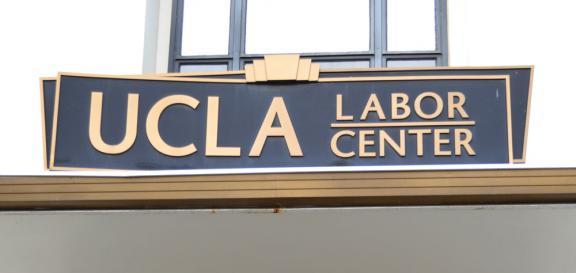Most Canadians hold competing ideas about Los Angeles in their heads at the same time: glamorous yet gritty, a sprawling suburb that is the second most populous city in America. At over 1,300 square kilometers inhabited by nearly four million people L.A. is bound to contain contradictions, but the different ways of living life that set the backdrop for the conference on Trinational Perspectives on the Future of Labour were not stereotypes or polarities. They were the quotidian and extraordinary lives of L.A.’s working people.
The Trinational Perspectives conference was brought together by the Rosa Luxemburg Stiftung, a German think tank committed to furthering discussion amongst the pluralist left in North America. The conference took place at the UCLA (University of California, Los Angeles) Labor Centre which resources programs and organizations housed at the UCLA Labor Center like the Black Worker Center, California Construction Academy, Dream Resource Center, National Day Labor Organizing Network (NDLON) with research provided by the university’s labour studies program.
L.A. one of the strongest centres of a resurgent American labour movement, fueled in large part by the growing immigrants’ rights movement in the United States.
Upstairs, students and activists provided advice and support to Los Angelino workers. Downstairs, about 25 trade unionists from Mexico, the U.S. and Canada talked about the impact of international trade agreements on workers, tools they could share across borders, and the challenges they face.
The panels at the conference wove together a variety of cross-border work. The first group began with a discussion of the Tri-National Solidarity Alliance, a group formed to engage Canadian, Mexican and U.S. unions in solidarity work. After explaining the many challenges faced by independent unions in Mexico and the actions taken in by U.S. and Canadian unions in support, panelist Benedicto Martinez reminded participants Mexican unions were not just recipients of support, but that “solidarity flows north”. Mexican unions part of the Alliance recently sent letters supporting American General Electric workers during negotiations.
During the Tri-National Coalition to Defend Public Education panel, the activists shared about how much they learned from each other when dealing with the effects of commodification NAFTA brought into public education, especially on textbook and education material. Questionable priorities was another common theme. “We have laptops but no nurses,” commented a California observer during the panel’s Q&A period.
The Tri-National Telecommunications Alliance panel featured some of the longest cross-border relationships. U.S. unions like the CWA saw a strategic benefit to working with their independent counterparts in Mexico to ensure workers were protected so that corporations wouldn’t chase the lowest wages across borders. While everyone is still fighting to make that goal a reality unions on either side of the border agreed they are stronger for their efforts in solidarity.
The two days culminated in accord to expand discussions to include workers from other sectors like agriculture, to scrutinize and stand up against new trade agreements like the Trans Pacific Partnership and to share stories that put a human face on the harm done by global markets.
Buoyed by the example set by the grassroots activism supported at the UCLA Labor Center, the conference delegates agreed to maintain the new and existing relationships and to keep talking.



